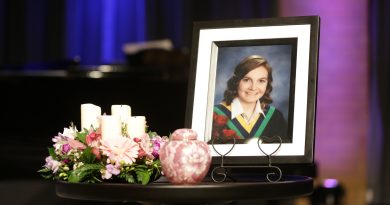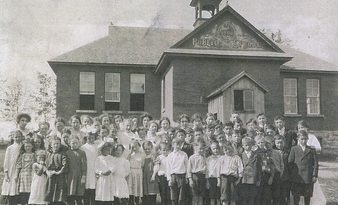A cold glass of lemonade and a warm smile
From the Other Side Column by Jeff Morris
Mr. Jackson rang the doorbell, backed off of the front step, took off his straw hat. He was a Black man with the lean build and rough, strong hands of someone who had worked hard for his entire life. I wasn’t sure whether he was a 60-year-old who looked like he was in his 80s, or a man in his 80s who looked like he was 60.
Likely the latter.
Mr. Jackson came to cut our grass every Friday, late in the afternoon. He rode his old bicycle through our neighbourhood in Frisco, Texas, pulling his lawnmower behind him. It was hot that summer, reaching 100 degrees Fahrenheit more than 60 straight days. Because I was travelling so much, flying to either Denver or Nashville on Monday mornings, returning home Thursdays, and then often back on the road again to Chicago or Atlanta for trade shows, I was thankful that Mr. Jackson was there to take care of our little one-sixth-of-an-acre patch of Texas. I told him he could use our lawnmower, but he liked to use his own. He was particular – an artist – kind of like Prince picking out the right guitar for each song.
My thoughts have been drifting back to Mr. Jackson after watching the outcome of the George Floyd murder trial. What would he have thought about the trial? Would he celebrate? Would he be relieved? Would it matter to him at all, because no matter what a jury decides, it won’t bring George Floyd back?
I thought I was racially sensitive. But George Floyd made me take a much needed long, hard look in the mirror. I am sure I am not the only middle-aged, middle class white guy to do the same. I had never really considered or thought about systemic racism.
Looking back, watching the aftermath of George Floyd’s murder made me think about Mr. Jackson and wonder about what he had faced and lived through during his long, hard life.
Every Friday, I would invite Mr. Jackson in for a glass of water or a glass of lemonade. He would never come through our front door. I would always try to convince him to come in. “It’s okay, were Caandian,” I even said once.
He would just smile and flash a mouthful of teeth that looked like an old picket fence, and his eyes would give me a warm twinkle that would cut through the leathered skin on his face.
We went through this Friday after Friday after Friday. Mr. Jackson would come to the door, ring the bell, back up, and take off his hat. I would ask him in for lemonade or water, and he would politely decline.
I was familiar with the effects of racism in the United States. I remember playing football on a semi-pro team near Buffalo. The Black guys and the white guys all got along. We were teammates, and a family. But I knew that outside of football, some of the guys on the team lived much different lives than I did.
My best friend on the team was a Black wide receiver who worked at 3M for his day job. When he and his wife and family moved into their new house in a middle class neighbourhood in a nice part of the city, the Buffalo police saw him sitting on his front step. They circled three times before approaching him.
“What are you doing here, boy?”
“This is my house.”
“Let me see your driver’s license.”
How’s that for a Welcome Wagon?
But meeting Mr. Jackson gave me a look at racism from a whole new perspective. He was probably a generation or two removed from working in the fields and singling “Cotton Eyed Joe.” As for me? As self-righteous as I might have thought I was, I was probably only three or four generations away from marching in the Orange Parade.
Finally, one day as Mr. Jackson finished, I walked up to him with a glass of lemonade.
“Sir,” I said, “I would be honoured if you would sit in the shade on the step with me and have a glass of lemonade.”
He awkwardly accepted, and we sat down.
He was quiet at first, but I broke the ice.
“So do you think the Cowboys will make the playoffs this year?”
He smiled at me, and began to talk football.
We had found our common ground. Now, we were friends.
Each week, before he left, I gave him a $20 bill.
“But it’s only $12, sir,” he would say.
“I know,” I would reply. “But you should charge $20.”
He would thank me, backing up, and off he would go. And, somehow, I knew that the extra $8 would end up on the collection plate at his church the following Sunday.
They say that a picture can tell 1,000 words. If that’s the case, the look in Mr. Jackson’s eyes could write an Ernest Hemingway novel. What has he gone through? What has he endured? Why was his America so different that the one I was living in at that time?
Twenty years have passed since that glass of lemonade. I imagine Mr. Jackson has passed on, now.
I think I will pray for him tonight. I will pray that he has found peace, and I will pray that souls in Heaven are colourless.




